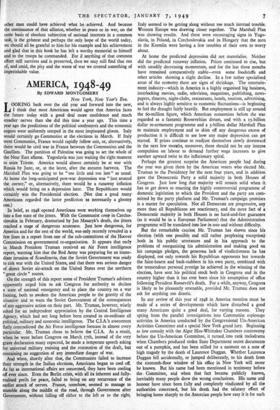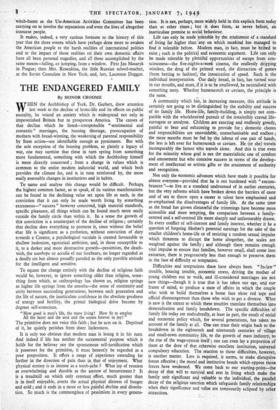AMERICA, 1 948-49
By EDWARD MONTGOMERY New York, New Year's Eve. LOOKING back over the old year and forward into the new, I think that most Americans would agree that America faces the future today with a good deal more confidence and much steadier nerves than she did this time a year ago. This time a year ago the predictions of the political soothsayers and the economic augurs were uniformly steeped in the most inspissated gloom. Italy would certainly go Communist at the elections in March. If Italy went Communist, France would rapidly follow suit, or, alternatively, there would be civil war in France between the Communists and the Gaullists. The partition of Palestine was going to set the whole of the Near East aflame_ Yugoslavia was just waiting the right moment to seize Trieste. America would almost certainly be at war with Russia by June, or, at the latest, after the autumn harvests. The Marshall Plan was going to be " too little and too late" as usual. At home the long-anticipated post-war depression was " just around the corner," or, alternatively, there would be a runaway inflation which would bring on a depression later. The Republicans would certainly win the Presidential election. (Not that a good many Americans regarded the latter prediction as necessarily a gloomy one.) In brief, as 1948 opened Americans were working themselves up into a fine state of the jitters. With the Communist coup in Czecho- slovakia in February, dramatised by Jan Masaryk's death, the jitters reached a stage of dangerous acuteness. Just how dangerous, for America and for the rest of the world, was only recently revealed in a few lines in a report from one of the sub-committees of the Hoover Commission on governmental re-organisation. It appears that early in March President Truman received an Air Force intelligence report, warning him that the Red Army was preparing for an imme- diate invasion of Scandinavia, that the Soviet Government was ready to risk war with the United States, and that there was serious danger of direct Soviet air-attack on the United States over the northern " great circle " routes.
On the strength of this report some of President Truman's advisers apparently urged him to ask Congress for authority to declare a state of national emergency and to place the country on a war footing, both to awaken the American people to the gravity of the situatior and to warn the Soviet Government of the consequences of any aggressive action on their part. Mr. Truman, however, wisely asked for an independent appreciation by the Central Intelligence Agency, which had not long before been created to co-ordinate all political, military and economic intelligence. The C.I.A.'s assessment flatly.•contradicted the Air Force intelligence forecast in almost every particular. Mr. Truman chose to believe the C.I.A. As a result, when he went before Congress on March 17th, instead of the very grave declaration many expected, he made a temperate speech asking for universal military training and the restoration of the draft, but containing no suggestion of any immediate danger of war. And when, shortly after that, the Communists failed to increase their strength in the Italian elections, Americans began to cool off. As far as international affairs are concerned, they have been cooling off ever since. Even the Berlin crisis, with all its inherent and fully- realised perils for peace, failed to bring on any recurrence of the earlier attack of nerves. France, somehow, seemed to manage to stumble along the middle of the road, through Government after Government, without falling off either to the left or to the right. Italy seemed to be getting along without too much internal trouble. Western Europe was drawing closer together. The Marshall Plan was showing results. And there were encouraging signs in Yugo- slavia, in Poland, in Czechoslovakia and in Hungary that the men in the Kremlin were having a few troubles of their own to worry about.
At home the predicted depression did not materialise. Neither did the predicted runaway inflation. Prices continued to rise, but
with steadily decreasing momentum, and for the last three months have remained comparatively stable—even some foodstuffs and other articles showing a slight decline. In a few rather specialised areas of the economy there are signs of shrinkage. The entertain-.
ment industry—which in America is a highly organised big business, interlocking movies, radio, television, magazines, publishing, news- papers, theatres, night-clubs, restaurants, hotels, tourism, advertising, and is always highly sensitive to economic fluctuations—is beginning to feel the draught fairly heavily. But employment is still up around the 6o-million figure, which American economists before the war• regarded as a fantastic Rooseveltian dream, and with a is-billion dollar re-armament programme and a 5-billion dollar Marshall Plan to maintain employment and to skim off any dangerous excess of production it is difficult to see how any major depression can get started. If prices continue to readjust themselves slowly downward in the next few months, moreover, there should not be any intense compulsion on labour to demand further wage increases to give another upward twist to the inflationary spiral.
Perhaps the greatest surprise the American people had during the year was given them by the American voters who elected Mr.
Truman to the Presidency for the next four years, and in addition gave the Democratic Party a solid majority in both Houses of Congress. Just how long that majority will remain solid when -it has to get down to enacting the highly controversial programme of domestic legislation to which the President and the party are com- mitted by the party platform and Mr. Truman's campaign promises
is a matter for speculation. Not all Democrats are progressive, any more than all Republicans are reactionary, and the mere fact of a Democratic majority in both Houses is no hard-and-fast guarantee (as it would be in a European Parliament) that the Administration programme will be translated into law in toto and without difficulty.
But the remarkable caution Mr. Truman has shown since his election (with one possible and still rather perplexing exception) both in his public utterances and in his approach to the problems of reorganising his administration and making good on his campaign pledges, the generous lack of vindictiveness he has
displayed, not only towards his Republican opponents but towards
the faint-hearts and back-stabbers in his own party, combined with the tremendous personal prestige he achieved in the winning of the election, have sent his political stock both in Congress and in the country higher than it has ever been since his assumption of office following President Roosevelt's death. For a while, anyway, Congress is likely to be pleasantly amenable, provided Mr. Truman does not ask for anything too drastic.
In any review of this year of 1948 in America mention must be made of a series of developments which have disturbed a good many Americans quite a good deal, for varying reasons. They spring from the parallel investigations into Communist espionage
activities in America conducted by the Congressional Un-American Activities Committee and a special New York grand jury. Beginning as low comedy with the Alger Hiss-Whittaker Chambers controversy before the Un-American Committee, it turned, into rank melodrama when Chambers produced stolen State Department secret documents out of a pumpkin, and has been stilled for a moment on a note of high tragedy by the death of Laurence Duggan. Whether Laurence Duggan fell accidentally, or jumped deliberately, to his death from the sixteenth-floor window of his office in New York will never
be known. But his name had been mentioned in testimony before the. Committee, and when that fact became publicly known,
inevitably many people drew the wrong conclusions. His name and honour have since been fully and completely vindicated by all the authorities concerned, but his death had the salutary effect of bringing home sharply to the Amercian people how easy it is for such 'witch-hunts as- the Un-American Activities Committee -has been carrying on to involve the reputations and even the lives of altogether innocent people.
It makes, indeed, a very curious footnote to the history of this year that the three events which have perhaps done more to awaken the American people to the harsh realities of international politics and to the impact of those realities on their own domestic affairs have all been personal tragedies, and all three accomplished by the same means—falling, or jumping, from a window. First Jan Masaryk in Prague; then Mrs. Kosenkina, the little Russian school-teacher, at the Soviet Consulate in New York, and, last, Laurence Duggan.







































 Previous page
Previous page